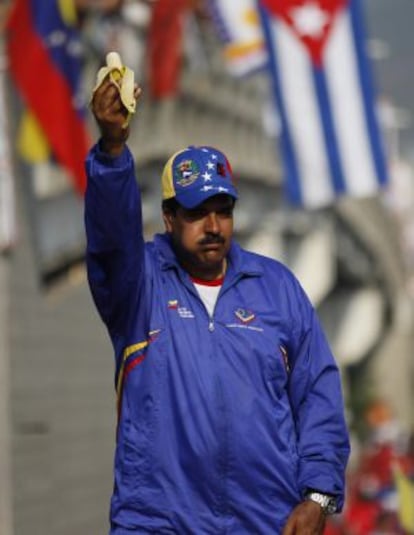Fraud and manipulation claims tarnish post-Chávez election
Global lawmakers ask race officials to ensure a clean ballot count on Sunday

With the heated campaign race in Venezuela coming to a close on Thursday, widespread concerns of voting fraud and other irregularities have emerged after the two major candidates accused each other of trying to manipulate the outcome of Sunday’s presidential elections in differing ways.
Interim President Nicolás Maduro and opposition contender Henrique Capriles have both publicly said that they will respect the final vote count but at the same time have warned their supporters of certain maneuvers by the other camp aimed at tarnishing the election.
In recent days, Capriles and other opposition leaders have charged that the government plans to “twist the will of the voters” by manipulating electronic voting machines. Maduro, meanwhile, said he has “proof,” which he will release in the coming days, of a plan “by the far right” to destabilize democracy, which could include not recognizing what he described as “my victory this Sunday.”
“No one can ignore the rule of law, the Constitution, democracy and, more importantly, the will of the people,” said Maduro, who was handpicked by President Hugo Chávez as his successor just months before he died on March 5 after suffering from cancer for more than two years.
The charges over possible election fraud and other irregularities have also led to calls from former leaders of nine countries and 350 lawmakers from 13 nations around the world to Venezuela’s National Electoral Council (CNE) demanding a fair process.
No one can ignore the rule of law and the will of the people” Nicolás Maduro
Eric Ekvall, an analyst with the Caracas-based Corporate Strategy Communications and an expert on Latin American campaigns, said that the Chávez camp and its supporters — who are now backing Maduro — have a long history of implementing “electronic fraud” in voting processes that go back to 2004, when a referendum was held on whether to revoke Chávez’s term in office.
Ludwig Moreno, of the NGO Clean Vote, said that some of the machines that will be used to count the votes are refurbished lottery machines made by Olivetti. He said he feared the opposition would repeat the same mistake it made in last October’s race when it allowed some 1.51 million people who hadn’t previously had their fingerprints scanned to cast their ballots by registering on election day itself.
“It was obvious that this threw the elections on the afternoon of October 7 when the ruling party won by 1.57 million votes,” he said. Capriles was the opposition candidate running against Chávez.
Meanwhile, a small number of violent incidents have been reported throughout the country. In western Táchira state, a Capriles campaign coordinator was shot and killed after he was kidnapped by unknown gunmen on Monday, police said.
Both candidates will end their campaigning by midnight Thursday — the time of the official deadline. Capriles, 46, who attracted more than two million people to a rally on Sunday in Caracas, will close his campaign in Barquisimeto, Lara state, while Maduro, a 50-year-old former bus driver, will hold his final rally in the capital.
Tu suscripción se está usando en otro dispositivo
¿Quieres añadir otro usuario a tu suscripción?
Si continúas leyendo en este dispositivo, no se podrá leer en el otro.
FlechaTu suscripción se está usando en otro dispositivo y solo puedes acceder a EL PAÍS desde un dispositivo a la vez.
Si quieres compartir tu cuenta, cambia tu suscripción a la modalidad Premium, así podrás añadir otro usuario. Cada uno accederá con su propia cuenta de email, lo que os permitirá personalizar vuestra experiencia en EL PAÍS.
¿Tienes una suscripción de empresa? Accede aquí para contratar más cuentas.
En el caso de no saber quién está usando tu cuenta, te recomendamos cambiar tu contraseña aquí.
Si decides continuar compartiendo tu cuenta, este mensaje se mostrará en tu dispositivo y en el de la otra persona que está usando tu cuenta de forma indefinida, afectando a tu experiencia de lectura. Puedes consultar aquí los términos y condiciones de la suscripción digital.








































